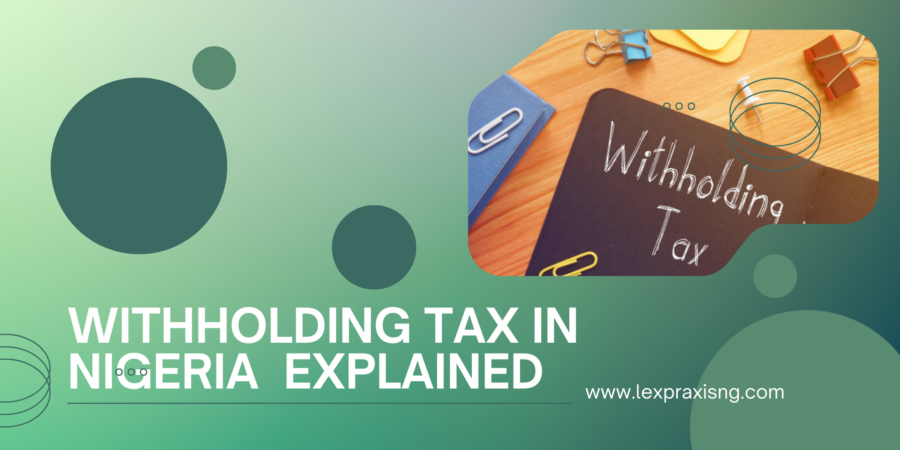Withholding tax (WHT) was introduced into the Nigerian Tax system to reduce and possibly terminate the incidents of tax evasion. In this article, we examine frequently asked questions on the subject such as; what is withholding tax in Nigeria, who pays withholding tax in Nigeria, how it works within the Nigerian tax administrative system, exemptions, etc
WHAT IS WITHHOLDING TAX IN NIGERIA?
This is a method used to collect income tax in advance and is often used to offset tax liabilities. It is not a type of tax, but an advanced income tax payment system processed on certain transactions as prescribed by law.
The withholding tax system is regulated by the Federal Inland Revenue Service.
WHO PAYS WITHHOLDING TAX
Withholding tax is paid by the individual or company making payment to the receiving party in a transaction. Depending on the type of transaction, the tax withheld by the payer in the said transaction is remitted to the tax authorities which in this case is the Federal Inland Revenue Service.
The party on whose behalf withholding tax is paid in advance is entitled to a credit note from the tax authorities (Federal Inland Revenue Service) which serves as proof that withholding tax has been deducted at source from the taxpayer.
WHAT TRANSACTIONS ARE SUBJECT TO WITHHOLDING TAX DEDUCTIONS?
The transactions that are subject to withholding tax are as follows; Commission, consultancy, technical, service fees, Royalties, Dividends, interest, rents, Hiring of equipment, Management fees, Directors fees, Contracts other than sales in the ordinary course of business, Construction (includes; roads, buildings, and bridges).
WHAT IS THE RATE OF WHT IN NIGERIA?
The rate of WHT in Nigeria varies per transaction. It ranges from 2.5% to 10% depending on the transaction.
Below is a summary of the rates in the party from whom advanced income tax is to be deducted in a transaction is an individual or company;
1. Commission, consultancy, technical, and service fees; 5% for individuals and 10% for companies
2. Royalties; 5% for individuals and 10% for companies
3. Dividends, interest, and rents; 10% for individuals and 10% and companies
4. Hiring of equipment; 10% for individuals and 10% for companies
5. Management fees; 5% for individuals and 10% for companies
6. Directors fees; 10% for individuals
7. Contracts other than sales in the ordinary course of business; 5% for individuals and 5% for companies
8. Construction (includes; roads, buildings, and bridges); 5% for individuals and 2.5% for companies
DO FOREIGNERS OR FOREIGN COMPANIES PAY WITHHOLDING TAX IN NIGERIA?
The answer is Yes. Nigeria shares double tax treaties with other countries such as; China, France, Netherlands, United Kingdom, Spain, Sweden, etc and where such treaties have been ratified by the National Assembly, the rates provided within such treaties are applicable.
On the other hand, where there are no tax treaties between Nigeria and another country in issue, then the Withholding tax rate is 10% on all applicable transactions.
ARE THERE TRANSACTIONS OR INDIVIDUALS EXEMPTED FROM WITHHOLDING TAX IN NIGERIA?
Yes, there are. Some of them include;
1. Companies operating in Free-trade zones in Nigeria
2. Interest on loans paid by Nigerian Companies.
3. Sales in the ordinary course of business.
4. Insurance claims.
5. Purchase over the counter.
6. Direct purchase of raw materials from suppliers as against middlemen.
7. Interest on Bonds.
8. Imported Goods
Dividends, interest, rent, or royalty derived from outside Nigeria and brought into Nigeria through government-approved channels such as The Central Bank of Nigeria, any bank or corporate body appointed by the Minister as an authorized dealer under the Second-Tier Foreign Exchange Market Act 1986, or any enactment replacing that Act.
WHAT IS THE DUE DATE FOR FILING WITHHOLDING TAX
The due date for filing withholding tax is on or before the 21st day of the succeeding month in which the deductions were made.
PENALTIES FOR NON-COMPLIANCE WITH WITHHOLDING TAX
The penalty for failure to deduct or remit WHT for late filing of returns is N25,000 (twenty-five thousand naira) for the first month, it occurs and N5,000 for each subsequent month the failure continues
CONCLUSION
Withholding tax is one of the most effective means of reducing tax evasion, just as it is the method best used for including more income earners in the tax net.
We hope we’ve been able to address frequently asked questions on this subject.
Need further assistance with tax compliance or need to make further inquiries about withholding tax in Nigeria? Feel free to reach out to us through the Whatsapp icon on the lower right part of this page or HERE, and we will respond to you.
RELATED ARTICLES
1. CAN I GET A TAX EXEMPTION LETTER FOR MY NGO?
2. DO NGOS PAY TAXES IN NIGERIA?




Leave a Reply